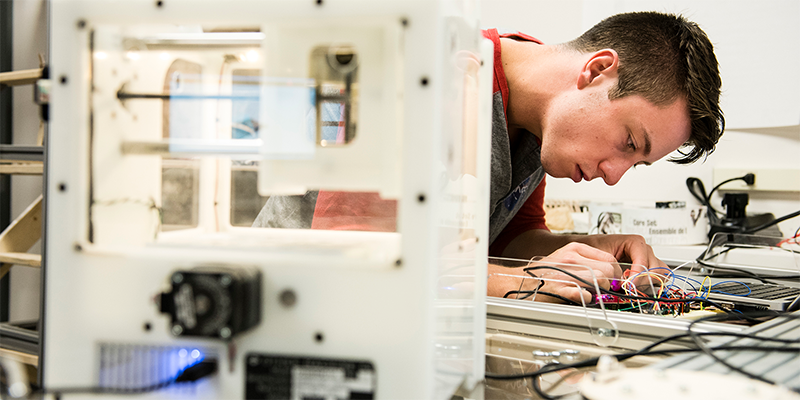Certificate Programs

The Department of Mechanical Engineering offers four certificate programs in Assistive Design, Human-Computer Interaction, Human Factors in Medical Devices and Systems, and Manufacturing Engineering. All certificate programs are open to students with a bachelor's degree and require the completion of four courses.
Assistive Design Certificate Program
A blend of human factors engineering and mechanical engineering, students in this certificate program will learn the fundamentals of design in both fields and apply them to the design of assistive devices to address real-world problems. The program serves as a technical credential to professionals interested in expanding their skill set to include designing for the needs of unique populations. These populations include professionals (e.g., veterinarians, dentists, and firefighters) as well as individuals with disabilities.
Their skills will be of value in the fields of rehabilitation, medical technology, education, and specialty services where dedicated understanding of a user’s needs in product design are required. Students with a passion for service to the community will find this program particularly worthwhile.
The courses in this program fulfill requirements in the MS in Human Factors Engineering and the MS in Mechanical Engineering programs. Students may transfer credits towards a master's degree in one of these programs at Tufts.
Human-Computer Interaction Certificate Program
With hardware processing power increasing and software development techniques improving, the user interface is quickly becoming the key bottleneck in developing computer products that meet market needs.
When the human-computer interface does not reflect the needs of the intended users, products fail in the marketplace and enormous sums of money are spent on documentation, help lines, and training courses to overcome the difficulties of running programs. Much of this difficulty can be avoided with proper attention to both the physical and psychological constraints of the user.
Extending the expertise of its internationally recognized Human Factors Engineering program, Tufts has designed this certificate program to train the next generation of computer programmers for tomorrow's complex programming challenges. Students must complete four courses, including those in engineering psychology, user interface design, and computer programming. Students interested in earning a graduate degree can often apply these certificate courses toward a master's degree in computer science or human factors.
Human Factors in Medical Devices and Systems Certificate Program
The Certificate in Human Factors in Medical Devices and Systems prepares students to help make medical devices and systems safe, effective, and satisfying to use. You will develop and enhance your skills in medical/health technology assessment, validation, and overall design. The certificate is particularly relevant for human factors professionals, user interface designers, and anyone working in the medical device industry.
The Medical Devices and Systems Certificate Program is offered both through a 100% online modality or a hybrid experience with online and in-person courses. The program consists of four courses, many available as evening classes. Two of these courses include Medical Fundamentals and Human Factors in Medical Technology. Electives may be chosen from various departments including mechanical engineering, psychology, computer science, occupational therapy, and more.
Manufacturing Engineering Certificate Program
As the United States continues to compete in global markets, the need for manufacturing engineers who can design, build, operate, and manage competitive production systems has never been greater.
Excellence in three-dimensional design and production—especially knowledge of quality CAD, CAM, CNC machining, and robotics—remains critical as industries strive to reduce labor costs, increase productivity and profitability, tighten performance standards, and improve quality.
The certificate program educates students in the latest technologies through a hands-on, industry-based curriculum, and contributes to the formation of future leaders in manufacturing engineering.
More questions? Email certificates@tufts.edu.